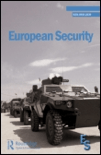
European Security
Scope & Guideline
Exploring the Complexities of Security and Cooperation
Introduction
Aims and Scopes
- European Security and Defence Policy:
This area focuses on the development and implementation of security policies within the EU framework, addressing issues such as strategic autonomy, crisis management, and the role of non-state actors. - Geopolitical Dynamics and Relations:
The journal explores the EU's relationships with major global powers, including Russia and China, analyzing the implications for European security and regional stability. - Securitisation Processes:
It investigates how various issues are framed as security concerns, examining the implications of these narratives on policy and public perception. - Human Security and Gender Perspectives:
This scope emphasizes the importance of human security, including gendered analyses of security strategies, reflecting on how security policies impact different demographics. - Crisis Management and Conflict Resolution:
The journal addresses the EU's role in conflict resolution and crisis management, particularly in the context of its neighborhood and in response to global crises. - Digital Sovereignty and Cybersecurity:
A focus on the intersection of technology and security, this area examines the implications of digital sovereignty and cybersecurity for European security architecture.
Trending and Emerging
- Impact of the Ukraine Conflict:
The ongoing war in Ukraine has catalyzed a surge in research examining its implications for EU security policy, strategic autonomy, and the broader geopolitical landscape. - Hybrid Threats and Non-State Actors:
A growing body of work is focusing on hybrid threats, including disinformation campaigns and the role of non-state actors in shaping security dynamics. - Health Security and Crisis Resilience:
The COVID-19 pandemic has prompted an increased focus on health security and the EU's capacity for crisis management and resilience in the face of global health threats. - Climate Change and Security:
Emerging themes related to climate change and its implications for security are gaining prominence, reflecting an understanding of environmental factors as critical to national and international security. - Digital Security and Cyber Warfare:
With the rise of cyber threats, there is an increasing emphasis on cybersecurity and the implications of digital sovereignty for European security architecture. - Gender and Security Studies:
The integration of feminist perspectives in security studies is expanding, addressing how gender influences security policies and practices in Europe.
Declining or Waning
- EU Enlargement and Accession Issues:
Previously a focal point in discussions of European security, the theme of EU enlargement has seen reduced attention, likely due to the current geopolitical focus on immediate security challenges rather than expansion. - Conventional Military Strategies:
Interest in traditional military strategies appears to be waning, possibly due to a shift towards hybrid warfare and non-conventional security threats that dominate current discourse. - Cold War Analogies:
The use of Cold War analogies in analyzing contemporary security issues is becoming less common as scholars seek to address unique modern challenges rather than draw parallels to past conflicts. - Focus on National Defence Policies:
There is a notable decline in papers focusing solely on national defence policies of EU states, as the journal shifts towards a more integrated and collaborative European security perspective. - Political Theories of Security:
Theoretical explorations of security politics, while still relevant, are not as frequently addressed, with empirical studies and case analyses gaining more traction.
Similar Journals

Politicke Vedy
Exploring the Depths of Political ThoughtPoliticke Vedy is a distinguished academic journal published by BELIANUM-MATEJ BEL UNIV PRESS, dedicated to the field of political science and international relations. With its ISSN 1335-2741 and E-ISSN 1338-5623, the journal serves as a vital platform for scholars, researchers, and practitioners to disseminate original research and critical analyses pertaining to contemporary political issues and theories. Although the journal currently operates under a non-open access model, it is committed to enhancing the academic dialogue and advancing understanding within the political realm. Based in Banska Bystrica, Slovakia, the journal aims to publish high-quality articles that reflect diverse perspectives and innovative approaches in political science. Its emphasis on rigorous peer review and scholarly integrity makes it an important resource for anyone seeking to engage deeply with political studies and international relations.

Economics of Peace and Security Journal
Exploring the Economic Pathways to Global PeaceEconomics of Peace and Security Journal, published by ECONOMISTS PEACE & SECURITY, serves as a critical platform for scholarship focusing on the intersections of economics, peacebuilding, and international relations. With an ISSN of 1749-852X, this interdisciplinary journal aims to explore the economic dimensions of peace and security, fostering a deeper understanding of how economic policies can influence stability worldwide. Despite its current standing in the Q4 quartile across various categories, including Economics and Political Science, the journal plays an essential role in advancing research on pressing global issues. By providing insightful analyses and empirical studies, it engages researchers, students, and policymakers in discussions that can lead to effective strategies for conflict resolution and sustainable economic practices. Although it currently offers limited access options, the aspirations for broader dissemination underscore its importance in contributing to the ongoing dialogue surrounding peace and security economics. Join the conversation and contribute to this evolving field as it navigates a complex and dynamic global landscape.
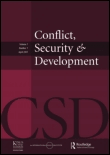
Conflict Security & Development
Advancing Critical Insights in Global Security and DevelopmentConflict Security & Development is a premier academic journal published by Routledge Journals, Taylor & Francis Ltd, focusing on the intricate intersections of conflict, security, and development in a global context. With a commitment to advancing critical scholarship, this journal serves as an essential resource for researchers, practitioners, and students in the fields of Political Science, International Relations, and Sociology. Achieving impressive rankings in both Q1 and Q2 categories for 2023, it holds prominent positions within its disciplines, including a commendable rank of #164 out of 706 in Political Science and International Relations and #395 out of 1466 in Sociology. Although it operates under a subscription model, the significant impact factor underscores its role in disseminating groundbreaking research and insights that address pressing global challenges. The journal's objectives include fostering interdisciplinary dialogue and promoting innovative approaches to understanding complex social phenomena, making it an indispensable publication for anyone invested in the nexus of security and development.
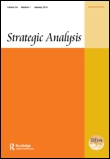
Strategic Analysis
Uncovering strategic frameworks for a safer tomorrow.Strategic Analysis is a prominent academic journal published by Routledge Journals, Taylor & Francis Ltd, focusing on the critical fields of Political Science and International Relations, as well as Safety Research. With an ISSN of 0970-0161 and an E-ISSN of 1754-0054, it stands out as a valuable resource for scholars and professionals interested in strategic studies and related disciplines. The journal's esteemed reputation is highlighted by its placement in Q3 and Q4 categories in the respective fields for 2023, indicating its significant contribution to knowledge and discussion within these domains. Covering a broad timeline with converged years from 1978 to 1984, 1998 to 2004, and now from 2007 to 2024, it provides a platform for innovative research and analytical insights. Readers can benefit from in-depth studies and reviews that address contemporary challenges and strategies in public policy and safety, making it an essential read for researchers, practitioners, and students alike. Although it does not currently offer open access, the journal remains committed to disseminating high-quality research aimed at enhancing strategic frameworks and improving decision-making processes on a global scale.
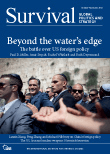
SURVIVAL
Championing Rigorous Research for a Resilient FutureSURVIVAL is a leading academic journal published by Routledge Journals, Taylor & Francis Ltd, focusing on the critical intersection of political science, international relations, and sociology. Since its inception in 1959, this esteemed journal has provided a platform for rigorous research and insightful discussions that address pressing global challenges. With an impressive impact factor and a Q2 ranking in both Political Science and Sociology categories, SURVIVAL is recognized for its high-quality, peer-reviewed articles that appeal to researchers, professionals, and students alike. The journal strives to promote interdisciplinary dialogue and foster a deeper understanding of survival in contemporary societies, making it indispensable for those who seek to navigate and influence the complex political landscapes of our time.
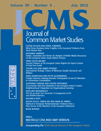
JCMS-Journal of Common Market Studies
Exploring the Dynamics of Market IntegrationAbout JCMS - Journal of Common Market Studies
Published by Wiley, the JCMS - Journal of Common Market Studies has been at the forefront of research in economics, political science, and international relations since its inception in 1962. With an impressive track record, the journal holds a Q1 ranking in multiple categories, including Business and International Management, Economics and Econometrics, and Political Science, reflecting its esteemed position in the academic community. As of 2023, it ranks 52nd out of 706 in Political Science and International Relations and 155th out of 716 in Economics and Econometrics. The journal aims to provide insightful analyses and comprehensive studies on common market integration and its implications on business practices and policies globally. Although it operates under a traditional access model, the content it disseminates is invaluable for researchers, practitioners, and students aiming to deepen their understanding of market dynamics and cross-border collaborations. With plans to continue exploring emerging trends up to 2024 and beyond, JCMS remains a vital resource for advancing knowledge in these critical fields.

Revista UNISCI
Advancing Political Discourse for a Global AudienceRevista UNISCI is a distinguished open-access journal published by UNIV COMPLUTENSE MADRID, SERVICIO PUBLICACIONES, dedicated to advancing the discourse in the fields of Political Science and International Relations. Since its inception in 2005, it has established a platform for emerging scholars and seasoned researchers alike to share innovative ideas and findings. With an E-ISSN of 2386-9453, Revista UNISCI is accessible to a global audience, facilitating knowledge dissemination in an increasingly interconnected world. The journal has been categorized in Q4 quartile for 2023, highlighting its relevance in the competitive landscape of academic publishing, while its Scopus rank of 566 out of 706 positions it among the prominent voices in the discipline. As the journal enters its converged years from 2015 to 2024, it aims to foster interdisciplinary dialogue and contribute to ongoing research debates, ultimately enriching the academic community’s understanding of critical global issues.

Czech Journal of International Relations
Navigating the Future of International Relations TogetherCzech Journal of International Relations is a premier Open Access journal published by Institute of International Relations, Prague, dedicated to advancing the study of international relations from a Czech perspective while fostering global scholarly discourse. With the ISSN 2788-2985 and E-ISSN 2788-2993, the journal embraces a rich array of topics within the fields of political science and international relations, contributing significantly to the academic community. Since transitioning to open access in 2017, it has enhanced accessibility for researchers, professionals, and students worldwide, promoting a diverse exchange of ideas. With an emerging reputation in the scholarly community reflected in its Scopus rank of #319 out of 706 in the Social Sciences category, the journal is poised for significant growth and influence in the years to come. The editorial team ensures a rigorous review process, maintaining high academic standards while encouraging innovative research trajectories from 2023 to 2024. Scholars are invited to explore and contribute to a journal that not only highlights critical issues within international relations but also serves as a vital resource for future-oriented research.
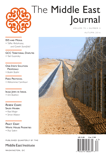
MIDDLE EAST JOURNAL
Illuminating the Rich Tapestry of Middle Eastern StudiesThe Middle East Journal, published by the esteemed Middle East Institute, serves as a vital platform for scholarly discourse on the complexities of the Middle East, encompassing rich analyses in the fields of Sociology, Political Science, and Geography. With a legacy dating back to 1976, this journal continues to shape contemporary dialogues, offering rigorous research and insights that influence policy-making and academic studies alike. Academic readers will note its Scopus rankings, positioning it within the lower quartiles of Geography, Planning and Development and Sociology and Political Science, reflecting an opportunity for growth and increased visibility within these fields. Although the journal is not open access, it remains an essential resource for those aiming to enhance their understanding of the historical and current dynamics of the Middle East. The Middle East Journal stands as a testament to the region's complex socio-political landscape and offers a comprehensive lens for both established scholars and aspiring researchers.
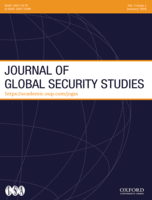
Journal of Global Security Studies
Fostering dialogue on pressing global security challenges.The Journal of Global Security Studies, published by Oxford University Press, is a premier scholarly journal dedicated to advancing the field of political science and international relations, with a particular emphasis on global safety research. Established in 2016, this journal has rapidly made its mark, attaining a distinguished Q1 ranking in both Political Science and International Relations as well as Safety Research categories in 2023, reflecting its high impact and contribution to the discourse surrounding global security issues. Boasting a strong standing in Scopus, ranked #133 out of 706 in Political Science and #36 out of 109 in Safety Research, it serves as a vital platform for scholars, practitioners, and students eager to explore emerging trends and pivotal studies in security matters. Although not open access, the journal ensures that rigorous peer-reviewed research is made available to a wide audience. The Journal of Global Security Studies continues to foster critical dialogue and research, making it an essential resource for anyone interested in the complex landscape of global security.